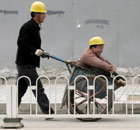Economy
Central China province denies GM rice accusation
(Xinhua)
Updated: 2010-03-20 15:31
 |
Large Medium Small |
CHANGSHA - Central China's Hunan province said on Saturday rice on sale at its supermarkets was not genetically modified and refuted environmental group Greenpeace's accusation.
The provincial agricultural department said in a statement that no pest-resistant genetically modified ingredients had been found in samples of all 32 brands of rice being sold on the local market.
"Samples were taken from the Wal-Mart outlet on South Huangxing Road in the provincial capital Changsha, and several other stores and mills in the province last Monday and Tuesday, but no GM ingredient was found after careful analysis by professional testing institutions," the document said.
| ||||
Greenpeace said in a report last Monday that GM rice was being sold at supermarkets in Hunan, including the Wal-Mart outlet.
Greenpeace said its study was conducted in October.
China's central government approved a program in 2008 to cultivate high-yield, pest-resistant genetically modified grains as it faced the challenge of feeding its 1.3 billion people and battles both shrinking arable land and climate change.
But Chen Xiwen, a senior rural affairs official, said GM foods still had a long way to go before they could reach the Chinese market as they were currently unable to get the necessary certificates from health and quality inspection authorities.
Last year, the Ministry of Agriculture (MOA) issued safety certificates for GM rice that is resistant to certain insects, as well as corn that helps pigs absorb more nutrients, Vice Minister Wei Chaoan said at the annual parliament session last week.
But Wei said the certificates were "more a recognition of scientists' work and achievement than the approval for commercial production".
Opinions from Chinese scientists on the safety of GM food, however, vary.
Leading agricultural scientist Yuan Longping has warned that some GM crops, particularly the anti-pest strains, need human trials for at least one or two generations as their health implications remain unclear.
But Huang Dafang, a member of the bio-safety committee affilicated to the MOA, insists GM crops have proven safety in previous animal testing.
"We are technically advantageous in hybrid rice planting. The genetically-modified technology could ensure China's superiority in food production," said Huang.











